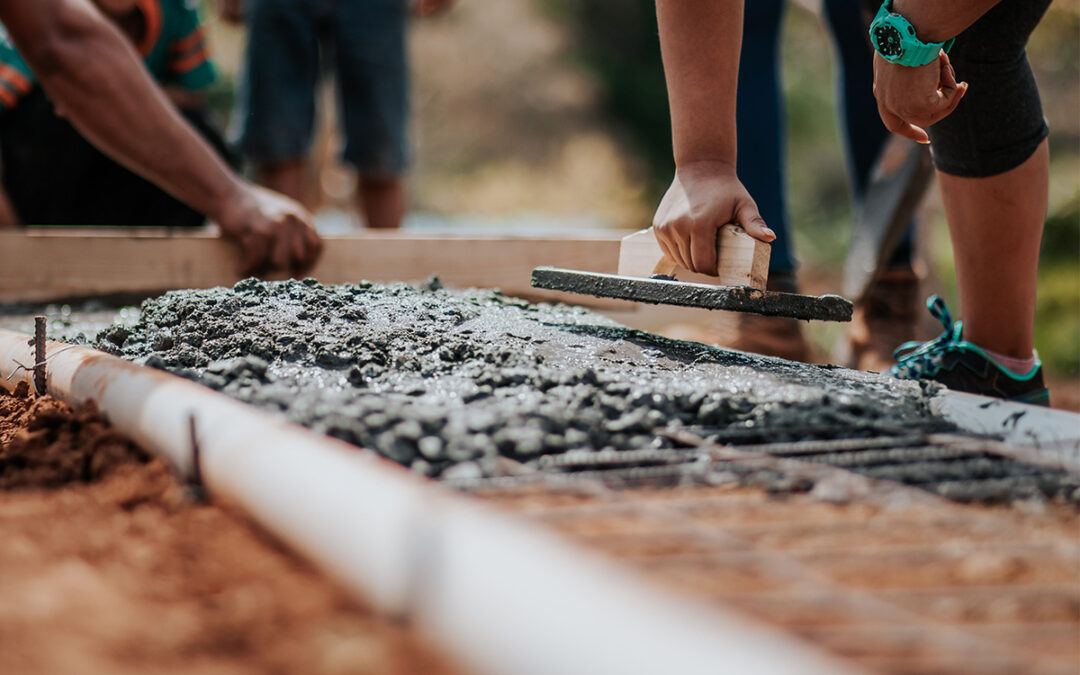


Normality!
The Ground Floor – Normal life At this point I will assume that you have a solid and stable foundation. If you do not, don’t worry. Try to concentrate on the relationships inside any room that is unstable or weak and allow yourself to know what it is about...
Building Recovery – Solidity and stability
Okay. So you have looked at the challenges involved in your recovery. You have now considered the most important questions such as cost, location and design. We now need to think about starting the work of recovery. That means building a good foundation. Once we are...
Addiction as an inappropriate relationship #3
Calling something good that is harmful to you
 This is the third article in the series – Addiction as an inappropriate relationship. In this final post we will be looking at one of the worst aspects of the inappropriate relationship. Namely that it looks good but is really bad. Inappropriate relationships are always presented as something good healthy or wholesome. In fact it is one of the most insidious things about them.
This is the third article in the series – Addiction as an inappropriate relationship. In this final post we will be looking at one of the worst aspects of the inappropriate relationship. Namely that it looks good but is really bad. Inappropriate relationships are always presented as something good healthy or wholesome. In fact it is one of the most insidious things about them.
Always connected with something desirable like love or spiritual enlightenment, inappropriate relationships are at best cheap imitations of these things. Deliberately harmful and deceitful, they lead the innocent into damaging and abusive places.
The worst inappropriate relationships always involve the innocent or vulnerable. Young people who are easily tempted with things they cannot get for themselves like a ride in a car or a bag of sweets. Addiction is similar in that the temptation is always about now! So it appeals to the child in us. It always offers instant gratification. There is never any thought or promise for the future, only now.
Big picture versus little picture

Large Cinema screen

Small picture view
This one of the methods I use frequently with my groups. The idea of small and large ‘screens’ as a way of understanding how you are ‘seeing things’ right now. It’s also one of the main reasons why personal growth, development and maturity are the answers for you as an addict. The more mature you become the more your view is ‘big picture’ not the ‘small picture’ of a child.
If when the temptation of this inappropriate relationship came you could summon up a picture even a tiny bit bigger than ‘right now’ you would be very likely to say NO THANKS. Even considering tomorrow morning would probably be enough, but in the past this has been beyond you. Your addictive relationship is only attractive in the ‘right now’ of the ‘small picture’ view.
Avoiding the ‘quick fix’ by changing your ‘screen’
Of course there are times when it is appropriate for you to go the other way and I teach this in the group I run. Ask yourself now is your problem in the past, future or present? Where is the thing that is making you feel bad? If it is in the past or the future it is a ‘big picture’ problem and you must shift to a ‘small picture view’. You do this by bringing yourself into the moment and asking yourself “what am I actually doing right now”? If it’s making a cup of tea, then make the best cup of tea you can and concentrate on it. Small picture!
If your issue is in the present then you must shift to a ‘big picture view’, in which you will feel better and gain some perspective. This is why when you are first presented with the substance that later leads to addiction it appears to be the perfect answer! Instant bliss! You can be transported to a place that has no problems or bad feelings associated with it for just a little money. As long as your health and money last you really have what appears to be the perfect solution to your issues. The perfect answer but only in a small picture view!
I was no different from you in my youth. I felt terrible and the thought of drinking and smoking weed gave me an instant ‘brain shift’ and better feeling. As I got older it was worse! Now I wanted to feel good not only without earning it, but in spite of all the wrong things I was now doing! So because you are doing the same this means that your ‘perfect’ answer is now somewhat more tarnished than when you were young. But it still offers you a powerful relief from the bad feelings you have.
Defining the appropriate relationship
We hear so much about the inappropriate relationship these days. A simple search on the internet brings up heaps of material on Teacher – Student relationships, incestuous relationships, as well as the more common extra-marital relationships.
The more subtle forms of inappropriateness such as the controlling partner and the psycho boss are harder to find but are still plentiful if you search a bit harder. When it comes to things that are more challenging to define such as manipulative friends and people who are over keen to be in the spotlight of leadership or be ‘running things’ there is a lot less information. It is here that the boundaries get a little blurred.
What if we started at the other end? What if we started by defining what makes an appropriate relationship? This is problematic because it is much harder to generalise around health than it is around the unhealthy. Here are a few things that appropriate living relationships include. Along with some links to further reading.
Equality – except where the power differential is written into the relationship such as counselling or a work hierarchy.
http://www.goodtherapy.org/blog/relationship-fairness-what-a-50-50-balance-means-0826134
Dignity – Allowing the other personal agency and a freedom to make their own choices.
https://www.psychologytoday.com/blog/dignity/201304/what-is-the-real-meaning-dignity-0
Boundaries – Appropriate relationships have boundaries that are well formed and understood.
http://www.sharonhersh.com/2015/06/what-is-an-inappropriate-relationship/
Recovery as an appropriate relationship!
When you make a decision to move towards recovery, you are saying that you want all your relationships to be healthy, have good boundaries and able to grow and develop! You will understand the unhealthy nature of the relationship you have with your substance/behaviour much better after reading this series of episodes on the inappropriate relationship .
I have an appropriate relationship with poison. I avoid it! Of course developing more healthy relationship with your substance or behaviour of choice also means developing your relationships with those around you. If your friends, work colleagues, or even your family are using and constantly tempting you towards these substances or behaviours you must consider placing strong boundaries in these relationships, or at the very least strong time constraints. I am not saying it is as simple as saying no! I have written extensively on how we develop a better relationship with our ‘drug of choice’.
Looking at your part
We have been talking so far about the idea of inappropriate relationships with you as the victim and the substance or behaviour as the perpetrator. That’s how it feels a lot of the time as you are extremely vulnerable once you are in an addictive pattern. It’s far too simple to see this relationship that way so now we need to look at your part in this unhealthy relationship.
It is important to realise that you are the abuser, not the substance. That’s why they say you are ‘abusing substances’. I want to take alcohol here as the typical example. It works well as an example as it has an accepted social use and is legal. As well as this it was my ‘drug of choice’ and so I do speak from experience!
Think about a friend or neighbour that you have and you need to borrow something or ask them a favour. Fine, they are okay with it. But now you ask again, and again, and again. You can see where this is going. Even the most patient and giving person is going to get to the end of their patience as you continue to abuse the relationship. I used alcohol beyond it’s socially accepted use and this is what happened. I abused the friendship and I lost it!
Developing better boundaries in all relationships
“When all your relationships with everything and everyone around you are healthy, or are becoming healthier, you are recovered”. I use this definition of recovery a lot and find it very useful in supporting people when they are reflecting on the way forwards for themselves. It locates the issue inside the ‘relationship’ rather than inside themselves or others. Ultimately it is what we make together that forms our world and our experience.
Try this exercise now. Think about specific relationships. With things as well as people. How could you make that relationship more healthy? I often advise looking for 5% improvements rather than going for broke! Now think about how you might go about that improvement. Remember, they don’t have to do anything or say anything to make this work. It all comes from you!
Of course we all must have relationships with inert things, such as sailing, football, television etc. But we are not ‘bonded’ with them! Always try to maintain healthy boundaries around them. I hope this series of articles has helped you to evaluate your relationships and given you a way of thinking about your addiction that offers a way forward. Thank you for taking the time to read this.

Addiction as an inappropriate Relationship #1
Addiction – Being in relationship with a dead thing
 I define addiction as an ‘inappropriate relationship’ in all my teaching and practice. Today I want to offer you some definitions and reasons why I work that way and how you can benefit from this understanding. Here is the first of those posts and I want to start with the most important and most harmful thing you may be doing. You are looking for something from the relationship that it cannot give you when you are addicted . Changing inappropriate relationships in recovery is one way of thinking about addiction that does not centre on how addictive a behaviour or a substance is. Rather this will help you to focus on how you engage with it and more importantly, how appropriate this relationship is.
I define addiction as an ‘inappropriate relationship’ in all my teaching and practice. Today I want to offer you some definitions and reasons why I work that way and how you can benefit from this understanding. Here is the first of those posts and I want to start with the most important and most harmful thing you may be doing. You are looking for something from the relationship that it cannot give you when you are addicted . Changing inappropriate relationships in recovery is one way of thinking about addiction that does not centre on how addictive a behaviour or a substance is. Rather this will help you to focus on how you engage with it and more importantly, how appropriate this relationship is.
The Relationship is real
So let’s start at the beginning. Why would I say that you are in a relationship? Well there are two things you cannot stop doing as a human being. Communicating and making meaning! We do it all the time and it is a large part of what makes us human. This is true when you are involved with living things and when you are involved with dead or inert things. So you are in relationship with everything! The question becomes, what sort of relationship is it? Is it healthy? Is it growing? Is it appropriate? Try this exercise now. Think of something, anything, it could be a game or it could be clothes or food. Ask yourself what you think about this thing. How you deal with it. Does it dictate to you or do you have the upper hand? Do you like it? All these questions and more tell you that you are in a relationship with this thing that is defined by your attitude and beliefs around it.
This can be very illuminating if you have not considered it before. Think of something now that you are involved with. Maybe work or the car. Now think of your relationship with it. You might think of boundaries, what you expect of it. How you abuse it. What you invest in it. How long you spend with it! All these are what we call reflective questions and help you to consider whether you want to change anything.
You are hardwired to bond with others
 You are in need. Human beings are hard wired to ‘bond’ with things around us so you are looking for something to bond with all the time.. People of faith and hard headed scientists both agree with this. We see bonding in a primitive way with ducks ‘imprinting’ on the first thing they see. In humans this is a more complex process.
You are in need. Human beings are hard wired to ‘bond’ with things around us so you are looking for something to bond with all the time.. People of faith and hard headed scientists both agree with this. We see bonding in a primitive way with ducks ‘imprinting’ on the first thing they see. In humans this is a more complex process.
When you were are first presented with your Mother’s face, you were ‘hardwired’ to ‘bond’ as quickly as possible. The psychiatrists tell us that as babies we know very well that we will die if we do not get bonded with this person who is going to feed us and care for us.
You are tempted further and further away from living relationships as your addiction develops and yet your need to be bonded remains. This draws you further and further into a deeper connection with your substance/behaviour. You deepen your relationship with your substance/behaviour every time you lose a friend, argue with a loved one, lose a job, feel depressed or angry and feel you cannot talk about it,.
Relationships are complex
 Of course we remain in relationship with loved ones even after we lose them and, as previously mentioned, seems like we are in relationship with everything, living and dead. Your problem is not that you are in a relationship. The person who does not drink at all is still in relationship with alcohol. The person who never gambles is still in a relationship with gambling. So your problem is the depth at which you have bonded with this behaviour or substance. If you are a person with an addictive personality there is every chance that your relationship with this substance should include a firm boundary that dictates never using it. Similar to the boundary we have around never touching poison. The relationship you have with this substance behaviour needs to become appropriate.
Of course we remain in relationship with loved ones even after we lose them and, as previously mentioned, seems like we are in relationship with everything, living and dead. Your problem is not that you are in a relationship. The person who does not drink at all is still in relationship with alcohol. The person who never gambles is still in a relationship with gambling. So your problem is the depth at which you have bonded with this behaviour or substance. If you are a person with an addictive personality there is every chance that your relationship with this substance should include a firm boundary that dictates never using it. Similar to the boundary we have around never touching poison. The relationship you have with this substance behaviour needs to become appropriate.
Living Relationships essentially involve three living things. Two people and the relationship itself. All three parties can change and develop. It’s the possibility of any or all of the three parties changing and developing that gives the whole thing life but also the thing that brings complexity and challenge. It’s this three way possibility in your relationships that define them as alive and unique. Therefore when you attempt to deepen your relationship with an inert or dead thing you fool yourself that you are in a living relationship. You now have only two things that can change instead of three!
You are fooling yourself when you see this as a living relationship. The thing that defines a relationship with an inert partner is that it is only you that can change the arrangements. Only you that can make decisions. Only you that can produce and maintain healthy boundaries.
Change is the one thing this relationship cannot offer you. It cannot give you life, change, develop or challenge you. It cannot hold you to account or expose your inconsistencies. It can only provide a chemical shift in your brain that, at least for a while, seems to provide a substitute for the real thing. There is only one problem and eventually everyone entering this type of addictive relationship comes to this point. It can’t give you a living relationship. More of this in the next episode.

